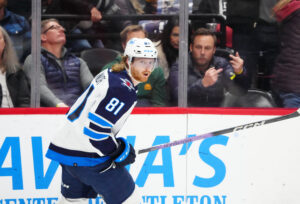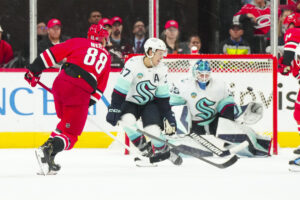It’s no secret that the Vancouver Canucks have more than one troublesome contract right now. Heck, Loui Eriksson is virtually shorthand for the phenomenon, alongside Milan Lucic and the other “Big Five” free agent signings that happened in the Summer of 2016. But which one is worst? There is potential that it could be a future contract in Nikolay Goldobin that causes the most trouble.
Vancouver Canucks Worst Contract
Options
Soon after Eriksson, Brandon Sutter is mentioned as a bad signing – no doubt coloured by his extensive injury history with the team. It started with a 20-game season in his first year, bookended by a 2018-2019 where he managed only 26 games. Brought in mostly as a shelter for sophomore Bo Horvat, he’s served that purpose and many fans would like to see the team move him out.
There was a shaking of heads among some when a 32-year old Jay Beagle was given his four-year deal at $3 million per year with a modified no-trade clause. His age and foot speed are in direct contrast with GM Jim Benning‘s claims of making a younger, faster team.
But none of these is the Canucks’ most troublesome contract.
Why They’re Not The Worst
Eriksson has NHL skills, though not ones that teams pay $6 million a year for. He had over 60% of his starts in the defensive zone; managed 19 more takeaways than giveaways; had the third-highest ice time shorthanded among forwards. On top of that, he chipped in 11 goals and 29 points. In other words, a perfectly decent fourth-line player. If his cap hit were a quarter of what it is, he’d be either easy to move or handy to keep. He only has $9 million in cash due to him over the next three years. If the Canucks take on some of that, then there may be a deal for him out there yet.
Sutter still has some good speed and a touch of scoring, getting 17 goals and 17 assists in his only full season with the team. Unfortunately, that season was two years ago. He’s lost 71 games since the start of 2017-2018, and it’s difficult to plan for the upcoming season without considering that history. His use tells you where he’s expected to perform for the team: like Eriksson, over 60% of his starts were in his own end.
Beagle was clearly brought in to be a positive influence in the room – how much that should cost a team is another matter. He led the forwards in total shorthanded ice time despite only playing 57 games, and started in his own zone more than 80% of the time.
And what can be said about Roberto Luongo‘s contract that he hasn’t already?
That these three deals are too expensive, too long, or the players too old are all definite issues with them. But are they the Canucks worst contract that the team should be concerned about? Not really: who the players are and how they will get deployed is relatively clear. You know what you’re getting with each of them, and none are going to surprise.
Final Two
Which leaves two contracts that stand out as mysteries for the coming season. Or one contract and one question mark.
Tim Schaller didn’t have a disastrous first year as a Vancouver Canuck, despite only managing 47 games. On a team ready to give the ice time to players who stand out in any way, Schaller was just there. The converted defenceman was sound positionally, but didn’t do much else. In theory, he would provide size and impact and a touch of scoring on the fourth line. None of those features were exceptional, though, and now there are other options on the wing, especially with the arrival of J.T. Miller and Micheal Ferland.
Schaller has asked for a fresh start on another team; if a trade happens he won’t be a troublesome contract for the Canucks any more.
Nikolay Goldobin
Nikolay Goldobin, on the other hand, could prove just as frustrating for the GM in the offseason as he is for the coach during it. He has undeniable offensive talent but the Canucks need scoring and would be ecstatic if he could provide it consistently. Nikolay Goldobin had predominantly (over 60%) offensive zone starts last season; understandable given his acknowledged defensive weaknesses.
Unfortunately, after lining up with either Horvat or Elias Pettersson all season and given heavily protected starts, he dropped from a 40+ point pace through the first half to an 8-point pace in the second. This leaves the Canucks is a bind as they consider his Restricted Free Agent status.
Nikolay Goldobin is going to be 24 years old entering the 2019-2020 season. While his numbers have been improving year-by-year, the team clearly wants to reach the playoffs now. They may not have the patience for him to work out his flaws. Players who are either more effective all-around or provide some extra grit, something that has never been a part of Goldobin’s game, are available. And if he’s not on the top two lines for Vancouver, is there any room for him?
Usage
Goldobin is at his most effective with creative players: unsurprisingly, he played his best with Pettersson and Brock Boeser. But the team clearly wants to a more abrasive player to skate with Pettersson. This leaves Goldobin a distant second choice to Boeser when deciding which skill player should skate on the top line.
If he loses the top spot, he could drop to Horvat’s left on the second line. Who is his in-team competition, then? The skilled Sven Baertschi; defensively reliable Josh Levio; the surprising Tanner Pearson; speedy agitator Antoine Roussel; and Miller. Any of those players more closely match Horvat’s style of play than Goldobin does. A top-six spot is much more in doubt than it is a certainty.
Coach Travis Green doesn’t much like players who are lax in their own end and he also prefers a clear division between his offensive and defensive lines. Given his past battles with Goldobin, it’s unlikely he’ll want to start the player in the bottom six any more than Goldobin will want to be there.
Goldobin Could Cause Trouble For Canucks
Goldobin remains a young, skilled, but ultimately inconsistent RFA going into a season with a team that might not be able to find space for him. His increased scoring could play a vital part for a team that ended last season 25th in goals for. However, his lack of defence might stop him from getting the opportunity. Do the Canucks move him for assets? As a sweetener? Do they risk selling him low after just a single full season? Or should they hang on to him in hopes his numbers improve further?
And that is what makes Nikolay Goldobin Vancouver’s most troublesome contract.
Main Photo:






